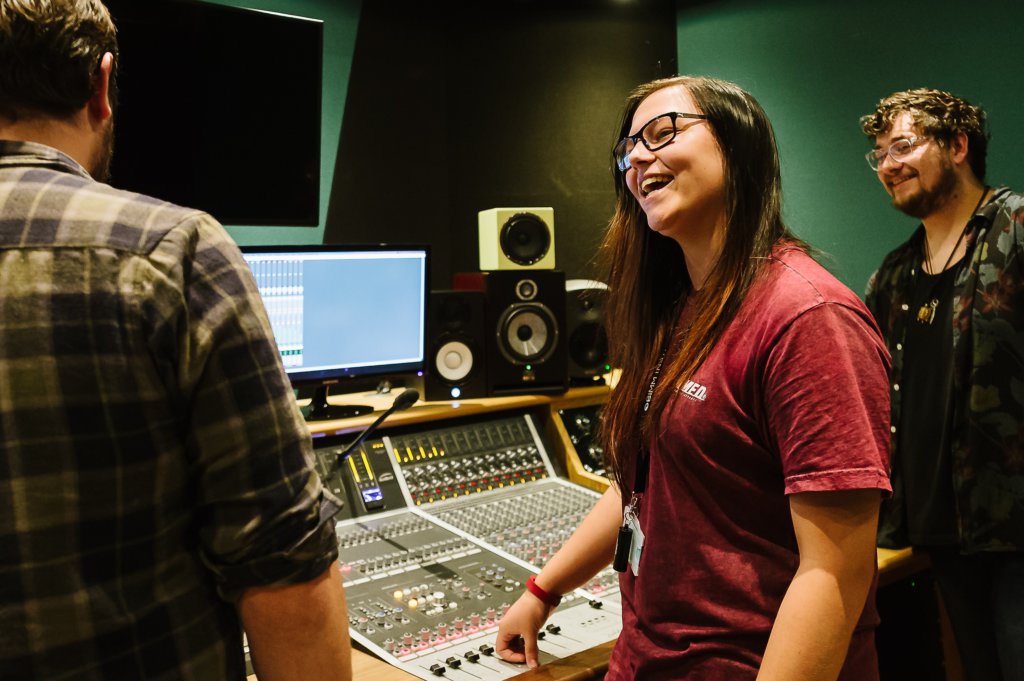BIMM Institute’s postgraduate programmes are more than just opportunities for music students to develop academically, creatively and professionally. They give each student a precious opportunity to go deeper into their lifelong passion.
“It has completely blown my mind,” says one student. “It has really taken me on a journey that I didn’t even expect – I came in with these ideas about what the MA was going to be, what I was going to learn and how I was going to use it. When I entered, I realised that it’s like a feast of knowledge that I can just dive into.”
Indeed, BIMM Institute – Europe’s largest, most connected music institute with eight colleges spread across the UK, Ireland and Germany – understands the power of passion, especially for those who want to turn it into a career. That’s why BIMM Institute has assembled an outstanding suite of superb industry connections, deeply knowledgeable teachers, and exciting specialist postgraduate modules to help their students achieve their life’s dream.
The MA Popular Music Practice allows students to decide their specialism within popular music, and become an expert in contemporary music. “This is well suited for music practitioners from a range of fields who have creative ideas, and like to collaborate with others especially from other disciplines,” explains Dr. Sini Timonen, Head of Postgraduate Studies.
By combining research and practice, this particular MA will enhance one’s skills and expertise within the creative industry. Building on either a bachelor’s degree or professional experience, this master’s degree can be taken full-time over one year or part-time within two years. Note that an international undergraduate student who applies for the Graduate Route Visa can study part-time. If you hold a study visa, you’ll have to study full-time.
“Both study options are suitable for existing undergraduate students to continue their journey with us into postgraduate education and offer the opportunity for professionals already working in the industry to enhance their practice in the field,” says Anna Marks, College Principal of BIMM Institute Berlin. “We are excited for students to join the research community of the BIMM group and to see the creative and academic projects that are developed throughout the MA.”
Students can collaborate and experiment while exploring a wide range of modules and specialisms. As the MA coursework revolves around projects that are meaningful to students, they are more likely to enjoy the creative process of choosing their path.

Like Grace Fellows, many BIMM Institute achieves personal and professional growth. Source: BIMM Institute
For student Grace Fellows, this MA convinced her to move all the way from California to London — a decision she has zero regrets for. “The community and network of support have been amazing. I keep reflecting on how much I’ve grown, it’s crazy!” she says. “The tutors are awesome and they really care. I feel like I finally have answers to questions I didn’t even know how to ask for the last four years of trying to learn this stuff on my own.”
Students can tailor their final project to focus on one of the following paths: performance, production, composition or entrepreneurship. It’s a bespoke journey from start to end — students have the flexibility to change specialism during the programme.
“The Popular Music Practice and Research module [in the first semester] allows the development of academic research skills to frame the final project. The other one – You and the Popular Music Industry – helps contextualise the student’s project, practice and career within the wider music industry,” says Paul Archibald, a lecturer at at BIMM Institute Bristol.

Opportunities to collaborate on creative projects abound. Source: BIMM Institute
In Semester Two, learning becomes more collaborative. In the Popular Music and Technology module, insights about technologies in creative practices and entrepreneurship will be studied within a mix of lectures, workshops and one-to-one mentoring. Then, students will work together to use research and practice in producing creative works which will be displayed in a symposium at the end of the second module “Exploring Collaborative Practice.”
“This symposium showcases all the amazing work done over the year. On top of that, you need to do 20 hours of project work with industry stakeholders: a company or an individual. So it’s all about working together and making those industry connections,” shares Timonen.
For the final semester, an expert in the student’s chosen field will supervise the Major Project that adds on to the growing field of practice-informed research on popular music. Students have completed exciting projects like an immersive live show combining lighting, visuals, music and physical theatre; a virtual reality installation; and an audio-visual performance with music and creative animations.
“The MA has truly changed how I look at my work and how I think about myself as both an artist and an academic. It has made me really delve deeper into what I want to create in the industry,” enthuses a graduate of BIMM Institute Bristol.

At BIMM Institute, students develop academically, creatively and professionally. Source: BIMM Institute
Joining BIMM Institute means being immediately welcomed into a community of like-minded creative professionals with diverse work backgrounds and access to some of the best industry-standard facilities. Postgraduate students can tap on the extensive BIMM Connect alumni network to expand their career options and creative partnerships too. For those wanting to teach or broaden one’s creative arts education knowledge, BIMM Institute offers the MA Learning and Teaching in the Creative Industries as well.
If you want to be taught by the best in the music industry, and become a contributor in the field and not just a learner, apply to BIMM Institute today.
Follow BIMM Institute on Instagram, Twitter, Facebook, YouTube, Spotify and SoundCloud










